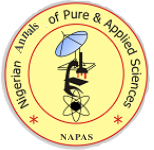Editorial Comments (Vol.3, Issue 1)
COVID-19 and Nigeria Scientists
That there is a global pandemic of COVID-19 is no longer news. We have gone through lockdowns with serious socio-economic implications. It has been estimated that the global economy would take decades to recover from this pandemic. The incidence in Nigeria continue to rise with national and local efforts to flatten the curve being complicated with politics and deteriorating health infrastructure. As Western governments and NGOs grapple with their own outbreaks, African nations are saddled with the responsibility of contending with the virus. The ongoing global COVID-19 outbreak has revealed how strikingly unprepared the world is for a pandemic.
Expert analysis reveals that at the beginning of May 2020, Africa had recorded over 52,000 COVID-19 cases with more than 2,000 deaths. Although this appears to be small relative to the global burden, the sad truth is that it is the tip of the iceberg. This is because of the low testing capacity of most African countries. According to the Africa Center for Disease Control, testing capacity ranges from 10 tests per 100,000 people in Ethiopia to 280 per 100,000 in South Africa. These pale in comparison to the rate of testing in Western countries.
With nationalism rising in the face of COVID-19, Africa is being relegated to the sidelines in acquiring much-needed diagnostics, as countries with the technology have restricted exports and preferentially sell to wealthier buyers.
African countries and scientists will have responded to the threat in quite different ways because our circumstances are different compared with the Western countries. Most importantly, these countries have quite different healthcare systems, economies, urban geography, political dynamics and social structures.
In the wake of surging global demand for personal protective equipment, widespread shortages have been reported. African countries need to find innovative local technology to manufacture face masks, shields, gloves, gowns, hand sanitizers and hand washing detergent, Nigerian entrepreneurs are waiting on the scientific community to take the lead in this regard.
While measures such as social distancing, frequent handwashing, and self-isolation are proven control measures worldwide, they work best for those in the upper and middle classes of
African society. Those with fewer resources often cannot maintain safe physical distancing in crowded households. Nor can they wash frequently without access to running water. Creative and innovative scientific solutions are therefore the pressing challenge before the Nigerian scientific community.
The next volume of the Annals of Pure and Applied Sciences will be encouraging researches and articles on a cross-disciplinary collection of research and perspectives on the pandemic in Nigeria. This issue will be published in November 2020 and will cover health science (virology, epidemiology, sanitation and hygiene), public health, urban ecology and anthropological perspectives, agriculture and food security. the Editorial Board is also encouraging investigations on medicinal values of local plant recourses and scientific analysis measures adopted to prevent the spread of the coronavirus, such as lockdowns and social distancing and basic hygiene.
The Annals of Pure and Applied Sciences will continue to provide a modern, highly-visible platform for publishing pan-African research and for this special issue in November, we welcome submissions in COVID-19-related scientific enquiry and prospects of local content and resources in the battle to contain the pandemic. It is our sincere hope that our contributors and readers will find this current volume educative and informative. We are committed to continue to improve on the regularity of our publications and enhance our global visibility with our robust and interactive website.
Prof. Edward Agbo Omudu
Editor-in-Chief


 Contact Us
Contact Us Editorial Team
Editorial Team Join As A Reviewer
Join As A Reviewer  Request For Print Copy
Request For Print Copy


 Cprint Publishers
Cprint Publishers